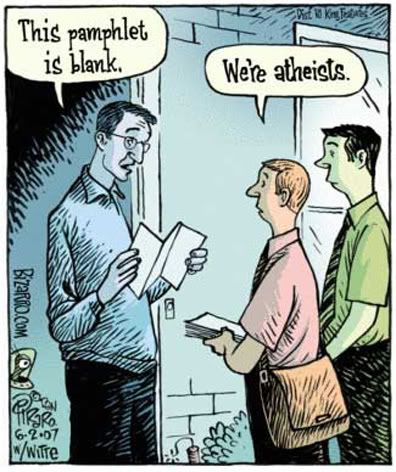Was this valuable to you?
other links and editorials from b_independent
According to the Bible, dying is the beginning of eternity where heaven or hell await. According to an atheist, death is the end of all experiences and nothing exists beyond the universe. There isn't any room for an in-between answer. Theists generally believe that God made the universe and everything in it. Generally, most atheists believe in evolution (although atheism isn't a scientific theory). Atheism is the absence of religion and, as a result, atheists do not believe any claim that includes God.
So is there anything upon which theists and atheists can agree? Well, for the most part, they agree that right and wrong exist. For a theist, God defines what is right and wrong. For example, to be considered a "good Catholic," you have to be against abortion, contraception, and homosexuality. To be considered a "good Jew," you have keep the Sabbath, keep Kosher, and go to the synagogue. However, ask any atheist and he will tell you that many wrongs have been committed in the name of religion. So what does it mean to be a "good atheist?"
What reasons does an atheist have for caring about others or being good to his fellow man? As an atheist doesn't believe that a "higher being" will punish him for his wrongs, what is it that drives an atheist to be moral? Without a god to tell an atheist right from wrong, how does an atheist decide? Do atheists believe in something greater than the individual, but just don't choose to call it God? How do you define good and evil in a universe without God? To whom are atheists accountable? Where do atheists find meaning?
It is probably true that almost all atheists stand for the values of reason and freethought. I will attempt to put these values in more substantial terms. There is the belief that inquiry and doubt are essential checks against deception, self deception, and error. There is the belief that logic and proper empirical method is the only way the whole world can arrive at an agreement on the truth about anything. And there is the belief that it is better to be good to each other and to build on what we all agree to be true, than to insist that we all think alike...
The values that play the most important role in any person's life are those which stem from the meaning they have found in their lives. It is the standard rhetoric of the religious that only god gives life meaning, but to really believe this one must first believe that human life, thought, happiness, even love, are all in themselves worthless and void of meaning. I think any atheist would agree this is absurd. Even if I were the accidental byproduct of a giant rubber tire machine, the mere fact that I live and know that I live would give my life meaning at once. And the moment I felt happiness or love, their meaning and value would be immediately obvious... And as all atheists know, all of these things would exist even without a god. For all that is needed is a person, who is capable of living, loving, and knowing happiness...
Morality is the favorite watchword of the religious. It is also a popular polemic to equate atheism with the complete absence of morality, as if a disbelief in god meant at the same time a disbelief in moral standards. Any inquiry into the beliefs of actual atheists in the matter of morals would prove this assumption wrong. Indeed, the atheist is often possessed of stronger moral convictions than devout believers. Abraham, so the Old Testament claims, abandoned his morals at the mere command of his god. He was prepared to commit murder, even kill his own son, and this was proof of his religious devotion. Like him, many a religious man is willing to push morals aside if he thinks his god has asked or allowed him to, if he thinks it is for "the greater good" of god. Not so the atheist. If god appeared to me and asked me to kill my son, even though I would have undeniable proof that god exists and was the supreme creator and the ultimate power of the universe, I would reject his command at once. I would prefer death to the defilement of what is right. To want murder is evil, and if God wanted murder, he would be evil--and no good man accepts a wicked master...
Atheists ought to stand for inquiry and doubt. They ought to stand for logic and sound empirical method as the only things capable of sorting true facts from false, to every reasonable person's satisfaction. They ought to stand for the humility to admit ignorance, and the wisdom to not assume too much, as well as the consequent political reality that finding common ground and negotiating differences is far wiser, and better for all, than maintaining adamant opposition on matters that do not even warrant an adamant opinion in the first place. The atheist ought to stand for using faith as justification for inquiry rather than belief. And the atheist ought to stand for happiness, and the understanding and accomplishment that are needed to achieve it. Above all, the atheist ought to stand for being a hero to himself and his fellow humans, rather than a villain. I believe that when the reasons for these values are truly understood, any man would hold to them and keep them, even if god himself appeared and ended all dispute as to his existence. Indeed, I believe an atheist ought to live her life so she can say with all sincerity, "even if God's existence were proven, I would change only my understanding of the facts, and not the values by which I guide my conduct and thought."
About atheism
 religion/atheismhttps://valme.io/c/religion/atheismc_prompt
religion/atheismhttps://valme.io/c/religion/atheismc_promptGod made me an atheist. Who are you to disagree?


